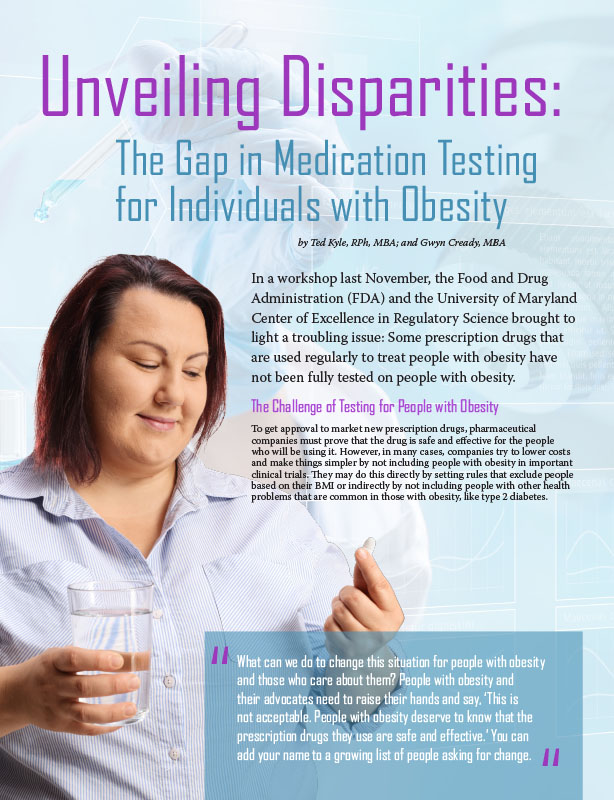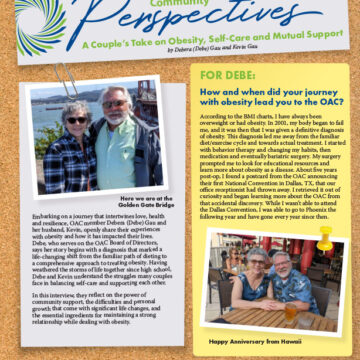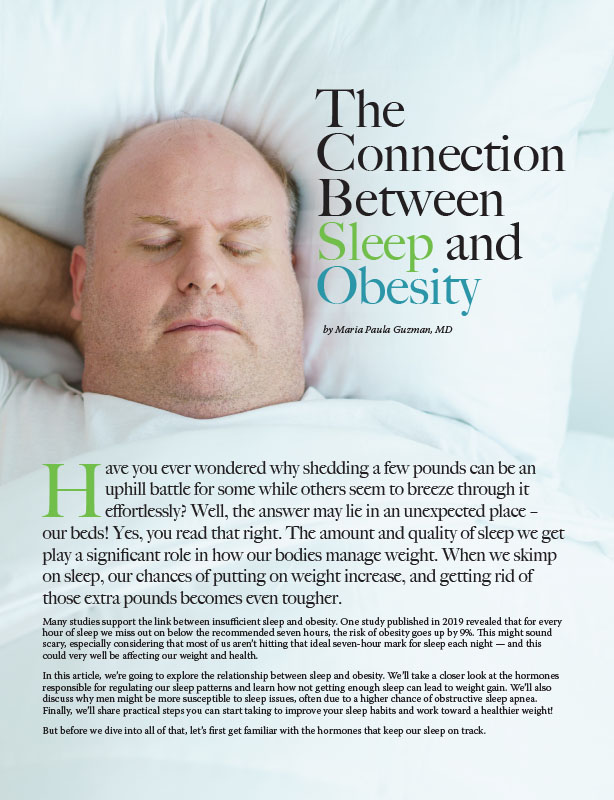Unveiling Disparities: The Gap in Medication Testing for Individuals with Obesity


by Ted Kyle, RPh, MBA; and Gwyn Cready, MBA
Fall 2023
In a workshop last November, the Food and Drug Administration (FDA) and the University of Maryland Center of Excellence in Regulatory Science brought to light a troubling issue: Some prescription drugs that are used regularly to treat people with obesity have not been fully tested on people with obesity.
The Challenge of Testing for People with Obesity
To get approval to market new prescription drugs, pharmaceutical companies must prove that the drug is safe and effective for the people who will be using it. However, in many cases, companies try to lower costs and make things simpler by not including people with obesity in important clinical trials. They may do this directly by setting rules that exclude people based on their BMI or indirectly by not including people with other health problems that are common in those with obesity, like type 2 diabetes.
The Case of Rexulti
One example is Rexulti. Rexulti is the brand name for a prescription drug used to treat schizophrenia and depression, two very serious conditions that can be life-threatening. Approximately 60% of people with schizophrenia also have obesity, which is considerably higher than the 42% rate of obesity in the general population. Additionally, drugs like Rexulti can make patients gain weight. Surprisingly, when the company Otsuka, the owner of Rexulti, studied the safety and effectiveness of the drug, they didn’t properly include patients with a BMI of 35 or higher in their trials.
In 2015, the FDA approved Rexulti for use in the general population based on the results of Otsuka’s study. This means that when physicians prescribe the drug for people with obesity, they don’t know if it is safe or effective in people with obesity. Patients might not even realize that they’re using something that hasn’t been fully tested in people of their size. That’s bad enough, but in 2021, former senior FDA officials and researchers from Tufts and Emerald Lake Safety used a model to study how the body processes drugs (called a physiologically based pharmacokinetics or PBPK model) and found that people with obesity who take Rexulti might take much longer to reach effective levels or may ultimately never do so. This suggests that people with obesity who use Rexulti for schizophrenia or depression might not be getting the right treatment or could be facing serious health problems.
During an interview, one person with obesity shared her thoughts when she found out that Rexulti hadn’t been fully tested on people of her size before getting approved:
“I think once a person is seen as overweight or having obesity, they’re just kind of discarded, even by the FDA. Like, we’re not important enough to figure out problems because there are so many of us on the planet. I mean, I’m an extreme example. I’m very overweight. But there are also people that are just 20 pounds or 50 pounds overweight. So, when you dismiss us, and you just say, well, this drug will work for this body, or this weight, this height, and you don’t research anything else, you’re failing a lot of people who desperately need these specific medications to function.”
Can Rexulti be adjusted to be safe and effective for people with obesity? Yes, it’s possible, and scientists have a solution. The scientists who conducted the study mentioned earlier developed a specific way to give people with obesity the right amount of the drug safely. The challenge is getting companies like Otsuka to change the drug’s instructions to include this method so patients and physicians have the correct information. Many companies are content to let physicians continue prescribing drugs using the dosing that works for people without obesity.
A Broader Issue
Sadly, Rexulti is not alone. There are a number of other drugs, aside from Rexulti, being given to people with obesity that haven’t been fully tested on them.
In last November’s workshop, the FDA agreed that this is an important issue. In the past, the FDA has made new rules about testing drugs on certain groups before they got approved. For example, in 1993, they required pharmaceutical companies to test drugs on women, not just men. In 2003, the FDA required pharmaceutical companies to test drugs on children if the drugs were likely to be used by kids. The push for pediatric testing actually started much earlier, with a voluntary request to pharmaceutical companies in the late 1990s. However, companies didn’t follow through so well, so the FDA made a formal rule in 1998. That rule was challenged in court, and the court ruled that the FDA did not have the authority to create the rule. It wasn’t until the Department of Health and Human Services pushed for new legislation that gave the FDA the power to require pediatric studies that the rule became official.
The FDA also makes companies test drugs differently for people with certain liver issues, who only make up approximately 2% of the population. Since people with obesity make up 42% of adults in the U.S. and those with pre-obesity are 31%, it certainly makes sense for pharmaceutical companies to prove their drugs are safe and effective for people with obesity, too.
The Call for Accountability
If pharmaceutical companies want to sell their drugs to people with obesity, they need to do the work to prove their product is safe and effective for them. And if a drug is already being used by people with obesity, like Rexulti, companies should change the label to show how to use it safely and effectively, or at least say on the label that the drug hasn’t been tested on people with obesity. Physicians need to understand what risks the drugs they are prescribing might have, and patients must understand what risks they are taking.
Click here to learn more about the OAC’s advocacy efforts in our ‘Fresh Perspectives’ episode on YouTube.
About the Authors:
Ted Kyle, RPh, MBA, is a healthcare professional experienced in collaborating with leading health and obesity experts for sound policy and innovation to address health needs and the obesity epidemic in North America. In 2009, Ted founded ConscienHealth to help experts and organizations work for evidence-based approaches to health and obesity.
Gwyn Cready, MBA, is a writer, strategist and advocate who graduated from the University of Chicago. In addition to Weight Matters Magazine, her work has appeared in USA Today, Real Simple, and other media outlets.
by Robyn Pashby, PhD Winter 2024 “No one is ever going to date you if you don’t…
Read Articleby Maria Paula Guzman, MD Have you ever wondered why shedding a few pounds can be an…
Read ArticleOverall, men have higher rates of overweight and obesity than women but are often less likely to…
View Video









